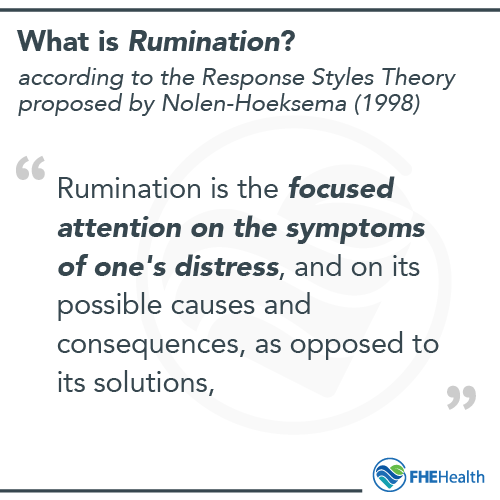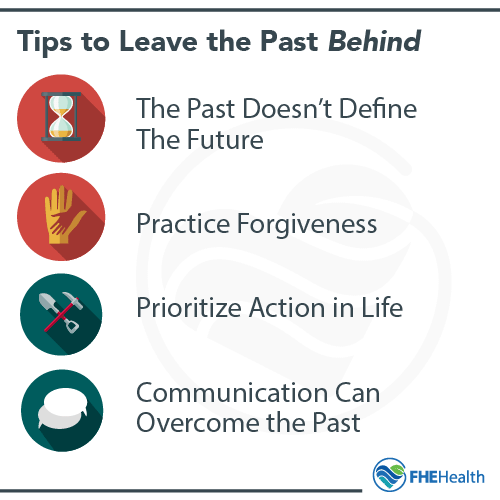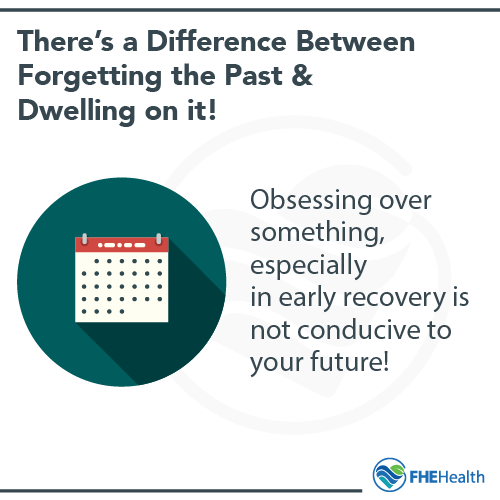
It’s not uncommon for people in recovery to think about the past — in fact, Step 8 of the 12 steps used by Alcoholics Anonymous in recovery specifically asks those in treatment to document the mistakes they made that harmed people in their lives.
There’s a difference between healthy reflection on the past and an unhealthy obsession, however, and patients often tend to struggle when trying to navigate this line. It’s healthy to learn lessons from the past, but at what point does reflection become dwelling on past mistakes, and how does one move on with their life?
In this piece, we’ll explain the difference between healthy reflecttion and an unhealthy behavior known as “ruminating,” as well as how to leave toxic and negative thoughts about the past where they belong: in the rear-view mirror.
What Is “Rumination”? How Dwelling on the Past Can Affect The Present
 We all know how it feels to think back to a mistake made or a meaningful event in life with an unpleasant outcome and have it occupy a significant amount of space in your thoughts. These negative memories can be unpleasant and intrusive, and the shame and regret they provoke often causes us to obsess over them.
We all know how it feels to think back to a mistake made or a meaningful event in life with an unpleasant outcome and have it occupy a significant amount of space in your thoughts. These negative memories can be unpleasant and intrusive, and the shame and regret they provoke often causes us to obsess over them.
What could have been done differently? How can that mistake be avoided in the future? To a degree, these questions are positive. If the situation is not examined, if it not faced it might be doomed to repeat.
But, there’s a point at which obsessing over these events can become unhealthy. This is called “rumination,” and it basically means thinking about the same thing over and over without any beneficial outcome. Research from Harvard University suggests that people who ruminate are at higher risk of depression. At the very least, dwelling on the past keeps you from growing — how can you make meaningful change in your life without letting go of things that can’t be changed?
Those in Recovery Are at a Special Risk
If you think about it, it makes sense. People in recovery, whether from a mental health disorder or a substance abuse issue (or a combination of both) are focused on promoting growth within their lives. These conditions are often marked by dark times in the lives of the people they affect — after all, behavioral health issues can completely rewire entire parts of the brain.
This means that people with substance abuse and mental health issues often have events in their past that cause them shame, regret, and other negative emotions. Adverse Childhood Experiences (ACEs) and other forms of trauma in one’s past (like sexual assault and military events) have been found to be predictive of substance use and abuse (Psychology Today: Link between ACE and Mental Health). This suggests that dwelling on the past can have especially negative consequences for people in treatment and recovery.
How Can Does One”Leave the Past Behind”?
 Forgetting events of your past can be easier said than done. Many people undergo years of treatment and therapy to get over especially traumatic or impactful events.
Forgetting events of your past can be easier said than done. Many people undergo years of treatment and therapy to get over especially traumatic or impactful events.
It’s important, though, because you can’t fully recover from the condition you’re struggling with until you can stop ruminating on negative memories. Here are four tips to leave the past behind you and move on with your life:
1. The Past Doesn’t Define The Future
There’s a reason why treatment for mental and behavioral health issues integrates themes of “building a new life” and “growing into a healthier lifestyle.”
Yes, addiction and similar diseases can affect your physical health in a wide variety of different ways, but that doesn’t mean you are your addiction or your disorders.
Today more than ever, we’re learning important lessons about behavioral health conditions. This group of issues can rewire the risk/reward centers of your brain — put simply, they can make you someone you’re not. People with addiction stop thinking about consequences the same way. They put substances above their relationships with friends and family.
Many people in recovery feel grief or intense regret about decisions they made to support their addiction or because they weren’t in their right mind. The point is, addiction and mental illness don’t discriminate. They can happen to anyone, and they can change your life in a variety of ways.
That’s why in rehab, your past shouldn’t affect (or define) your present or your future. Treatment is intended to give you a chance to start fresh, because no matter how shameful the events of your past are, they aren’t your fault. You shouldn’t be forced to live with them forever.
2. Practice Forgiveness
Many people dwell on the past, not because of an event caused by something they did, but because of something that was done to them. This is often the case with ACEs, because the victims of these events — children — are powerless to stop them.
This means that if trauma is held onto as the victim becomes an adult, they’re likely to blame their abuser for their condition. This is common in situations where children are abused by their parents or other family members. They may feel hurt because they were betrayed by the people they counted on to protect them.
What we’re finding more and more is that blame is not a healthy emotion to harbor. A PsychCentral article on the topic explains that while playing the victim may feel righteous and good, being defined by your pain is ultimately not the healthiest (PsychCentral: “Learning to Let Go of the Past”) way to deal with your past.
3. Prioritize Action in Life
If you want to put the past behind you, it’s time to take action. This is because actually doing something means understanding when something can be done. If you’re dwelling on some part of your past, here’s something you can try: Take one of the events you can’t stop thinking about and ask yourself: “What can I do right now to fix it?”
Usually, with events in your past, the answer is nothing. This is a theme in recovery and the reason why many AA meetings and other recovery groups involve embracing the Serenity Prayer:
God, grant me the serenity
To accept the things I cannot change;
Courage to change the things I can;
and wisdom to know the difference.
You can learn and grow from past events, but only if you use those events to inform changes to your life in your present and future. That’s why it’s so important to turn thoughts into action — it shows you what you need to leave behind and what you can use to your advantage going forward.
4. Communication Can Overcome the Past
Often, people dwell on the past because they haven’t been able to reach a satisfying resolution — a catharsis or a rewarding conclusion. Obviously, it’s too late to change events in the past, but with a little help, finding closure is still possible.
One way to put things behind you is to resolve them with professional help. That’s why so many treatment programs — inpatient and outpatient — put such a prominent focus on talk therapy and counseling.
By learning to express the feelings that we’re ruminating on, a professional behavioral health specialist can help flip the perspective on a situation. Putting your past behind you can be as simple as looking at a past event from a slightly different point of view.
But Don’t Forget the Past!
 Like we said before, there’s a difference between learning from the past and dwelling on it. Reflecting on the choices you made in your life means understanding where some of your problems come from and taking steps to ensure that they aren’t repeated. With this in mind, obsessing over something that happened in your past, no matter how memorable, isn’t the right approach to starting fresh in recovery.
Like we said before, there’s a difference between learning from the past and dwelling on it. Reflecting on the choices you made in your life means understanding where some of your problems come from and taking steps to ensure that they aren’t repeated. With this in mind, obsessing over something that happened in your past, no matter how memorable, isn’t the right approach to starting fresh in recovery.
This is something we teach all patients and clients in our treatment programs. Recovery is difficult, and if you’re being held back by recurring negative feelings about the past, it will be even more challenging. If you’re interested in learning more about how to move on from the past, feel free to reach out to the treatment specialists at FHE Health.






